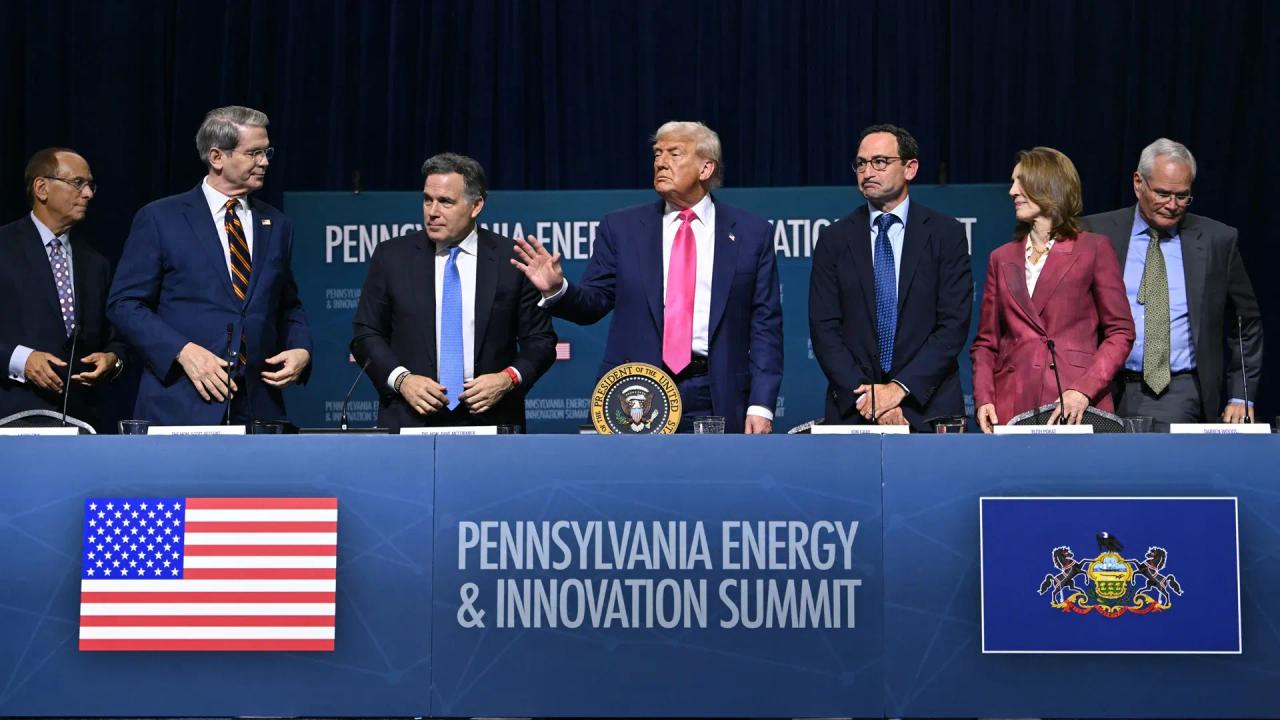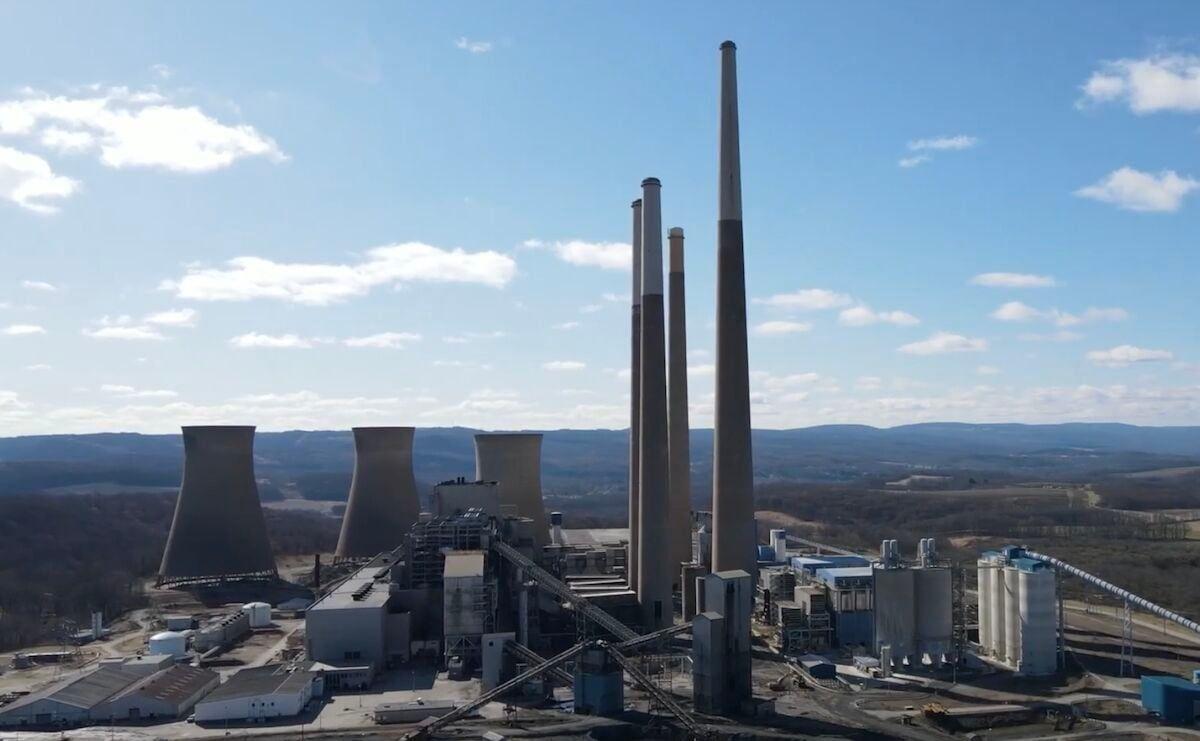Blackstone's $25B Investment in Pennsylvania: Powering the AI Revolution with Data Centers and Energy Infrastructure
5 Sources
5 Sources
[1]
Pennsylvania lands $25B Blackstone investment in data centers and energy
Why it matters: AI capability demands massive investments in data processing capability, which requires significant electricity. Driving the news: Blackstone will make the investment in northeast Pennsylvania, president and COO Jon Gray said Tuesday at the Energy and Innovation Summit in Pittsburgh, hosted by Sen. Dave McCormick (R-Penn.) at Carnegie Mellon University. President Trump is expected to attend the event. * "We've identified several sites that we've secured to build large data centers, which we think is critically important," Gray said. * And the company also plans "to make an announcement with a utility here in the state to build" natural gas plants, he added. * The project is expected to bring 6,000 construction jobs annually, plus 3,000 permanent jobs, Axios' Mike Allen reported Monday. * Blackstone will reveal more details later Tuesday. The big picture: AI companies are scrambling to fulfill their energy needs as their technology advances. * "We've got to get better on power," Gray said, adding that "it's a limiting factor" for the AI economy until then. * "We have to drill, baby, drill, and we have to build, baby, build," David Sacks, President Trump's AI and crypto czar, said at the summit. "We have to keep building new power." What to watch: Gray said "the special sauce" in the Blackstone investment will be "the idea that you can colocate the data centers directly next to the source of power."
[2]
A look at some of the major investments unveiled during AI and energy summit in Pittsburgh
With pomp and fanfare, the inaugural Pennsylvania Energy and Innovation Summit on Tuesday in Pittsburgh showcased the technological know-how of the region's universities and vast energy resources. While several investments were unveiled, the region's aspirations are much bigger. "The question we have to ask is what happens when that circus leaves? We have to make sure that this translates into investment into the city," Gecko Robotics CEO Jake Loosararian said. A lot of the investments announced on Tuesday are in the discussion phase, and most of the big-ticket projects are in the eastern part of the state. But in southwestern Pennsylvania, the focus is on generating the massive amounts of energy artificial intelligence requires. A $15 billion retrofit of the Homer City power plant to natural gas is expected to power a massive data center providing AI companies the computing capacity needed, and FirstEnergy says it's investing $15 billion in upgrades to Pennsylvania's power grid to provide the reliable transmission of electricity. "To enable things like artificial intelligence development, shale development and any other form of economic and technological development that there is," FirstEnergy CEO Brian Tierney said. But the biggest news involves Cranberry-based Westinghouse, which announced it will be building 10 large nuclear reactors across the country beginning in 2030, creating $75 billion of economic value nationally and $6 billion in Pennsylvania. Emerging from bankruptcy in 2018, the resurgent company says it needs to hire 15,000 new employees in the state. "These are great jobs across manufacturing, engineering and construction," interim Westinghouse CEO Dan Sumner said. Ramped-up energy production will enable the construction of more data centers like the one now proposed at the old Jones and Laughlin Steel site in Aliquippa, and centers like it are needed to spawn new AI and robotic companies like Pittsburgh's Gecko, which just recently attained unicorn status, meaning it's worth more than $1 billion. "We need to see investment from those companies into this region and continue to do so," Loosararian said. "You'll start to see an ecosystem of companies like Gecko beginning to emerge." And the summit is already spawning deals to employ AI technology, a partnership between Gecko and U.S. Steel, and another partnership between Google and Westinghouse. All of this is contributing to a new AI economy here in the region.
[3]
Trump promised to make Pennsylvania an AI hub, but how will it be powered?
Some of the investments promised during the AI and energy summit on Tuesday at Carnegie Mellon University included AI data centers, which can require massive amounts of energy to run. According to experts, it all comes down to what type of data centers are being built: bigger ones that require more power or smaller ones that don't put as much strain on the grid. While the promise of billions of dollars in investments is welcomed by many business and elected leaders, all the projects will need to be powered. Some of the data centers needed for AI can be loads up to 1,000 megawatts. Many data centers for other needs are only 20-100 megawatts. "When you're talking about putting a 1,000-megawatt or 2,000-megawatt load onto the grid, that is a massive load for a single geographic location. That is going to pose a risk to the electrical grid," University of Pennsylvania professor of electrical and systems engineering Dr. Benjamin Lee said. He said AI data centers need all that power because of graphic processing units, which draw more power. Depending on what AI facilities would be built, there is the chance that smaller data centers may be needed that could put less strain on the grid and be built in cities. Bigger ones will probably be in more remote areas. "That's going to require lots of land, maybe a generation plant to produce all of the electricity," Lee said. As for powering, there have already been talks of building natural gas plants and nuclear plants to meet the need. Lee said the fact that Pennsylvania has some of the most natural gas in the country makes the area prime for this investment. "I think natural gas is a big part of generating electricity for the future," Lee said over Zoom. There is the question of who pays for new energy infrastructure needed to power everything. Lee said power needs have stayed flat for about a decade but with these centers and pushes for electric devices, there is more need for the energy. "There is a question about what is the fair and equitable distribution of these costs," Lee said. According to the Penn professor, a challenge the energy industry faces is keeping up with technology and building power generators as fast as tech can be built.
[4]
Why This AI Company and Blackstone Are Investing $31 Billion Into Pennsylvania
The investment was announced as part of Sen. Dave McCormick (R-PA)'s Pennsylvania Energy and Innovation Summit, which kicked off Tuesday in Pittsburgh. President Trump also made an appearance at the summit, touting the $90 billion worth of investments Pennsylvania will see from private companies. Sen. McCormick is framing Pennsylvania as an emerging energy leader, since the state has well-established connections to natural gas and nuclear energy production. The state is home to four nuclear power plants. Powering the energy infrastructure to run artificial intelligence processing is highly intensive. That means AI hyperscalers like CoreWeave, which offer clients the infrastructure and services to power AI systems, are incredibly eager to clinch compute space in a competitive market that's looking to secure real estate on the quick. Other hyperscalers include Apple, Meta, and Amazon Web Services, better known as AWS.
[5]
Blackstone to invest $25 billion in Pennsylvania data centers and natural gas plants, COO says
(Reuters) -Blackstone plans to invest $25 billion in developing data centers and power plants in Pennsylvania, President and Chief Operating Officer Jon Gray said at a panel at the Energy and Innovation Summit in Pittsburgh on Tuesday. Blackstone had identified several sites to build the energy-intensive centers, Gray said, adding that the private equity firm also plans to partner with an electric utility to build multiple natural gas power generation facilities to fuel the data centers in Pennsylvania. Big Tech is fueling a turnaround in U.S. power consumption with the expansion of data centers, which are needed to train and roll out artificial intelligence. One of the biggest roadblocks in the race to expand artificial intelligence technologies are the long wait times, caused by supply chain constraints and permitting, to power data centers. Locating data centers directly at the sites of power plants, an arrangement known as co-location, can potentially cut down time to power. Blackstone plans to focus on co-located projects in Pennsylvania, Gray said. "What makes us so excited about this area is the idea that you can co locate data centers directly next to the source of power and that's really the special sauce here is being able to put these things together," Gray said. (Reporting by Ryan Patrick Jones in Toronto and Laila Kearney in New York)
Share
Share
Copy Link
Blackstone announces a massive $25 billion investment in Pennsylvania for data centers and energy infrastructure, highlighting the growing demand for AI computing power and the challenges of meeting its energy needs.
Blackstone's Massive Investment in Pennsylvania
Blackstone, the global investment firm, has announced a groundbreaking $25 billion investment in northeast Pennsylvania, focusing on the development of data centers and energy infrastructure
1
. This significant move comes as part of a larger initiative to position Pennsylvania as a hub for artificial intelligence (AI) and energy innovation, with total investments from various companies reaching $90 billion4
.
Source: Axios
The AI-Driven Demand for Data Centers
The investment is primarily driven by the escalating demand for AI computing power. As Jon Gray, President and COO of Blackstone, explained at the Energy and Innovation Summit in Pittsburgh, "We've identified several sites that we've secured to build large data centers, which we think is critically important"
1
. The project aims to address one of the most pressing challenges in the AI industry: the need for massive data processing capabilities and the corresponding energy requirements.
Source: Market Screener
Energy Infrastructure and Co-location Strategy
A key aspect of Blackstone's investment is the focus on energy infrastructure. The company plans to partner with a utility in Pennsylvania to construct natural gas plants, addressing the substantial power needs of AI data centers
5
. Gray highlighted the "special sauce" of their approach: co-locating data centers directly next to power sources, potentially reducing the time and complexity involved in powering these facilities1
5
.Economic Impact and Job Creation
The investment is expected to have a significant economic impact on the region. Blackstone projects the creation of 6,000 construction jobs annually, along with 3,000 permanent positions
1
. This influx of employment opportunities aligns with the broader goal of establishing Pennsylvania as a leader in the AI and energy sectors.Challenges and Considerations
While the investment promises substantial benefits, experts highlight potential challenges. Dr. Benjamin Lee from the University of Pennsylvania notes that large AI data centers can require up to 1,000 megawatts of power, posing potential risks to the electrical grid
3
. The fair distribution of costs for new energy infrastructure and the need for the energy industry to keep pace with rapidly advancing technology are additional concerns3
.Related Stories
Broader Context and Future Outlook
This investment is part of a larger trend of AI companies and investors seeking to secure computing resources and address energy needs. Other major players like CoreWeave, Apple, Meta, and Amazon Web Services are also actively expanding their data center capacities
4
. The summit in Pittsburgh, which featured appearances by Senator Dave McCormick and President Trump, underscored Pennsylvania's potential as an emerging energy leader, leveraging its established connections to natural gas and nuclear energy production4
.
Source: Inc.
Conclusion
Blackstone's $25 billion investment in Pennsylvania represents a significant step towards addressing the growing demands of AI technology. By focusing on the critical intersection of data processing and energy infrastructure, this project could potentially set a new standard for how AI computing resources are developed and powered. As the AI revolution continues to unfold, the success of this investment could have far-reaching implications for the future of technology, energy, and economic development in the region and beyond.
References
Summarized by
Navi
Related Stories
Trump and Tech Giants Converge in Pittsburgh to Promote AI-Powered Energy Future
14 Jul 2025•Business and Economy

Google and Meta Lead Massive AI Infrastructure Investments in the US
15 Jul 2025•Business and Economy

Pennsylvania's Largest Coal Plant to Become Massive AI-Powered Data Center Campus
03 Apr 2025•Technology

Recent Highlights
1
ByteDance Faces Hollywood Backlash After Seedance 2.0 Creates Unauthorized Celebrity Deepfakes
Technology

2
Microsoft AI chief predicts artificial intelligence will automate most white-collar jobs in 18 months
Business and Economy

3
Google reports state-sponsored hackers exploit Gemini AI across all stages of cyberattacks
Technology





